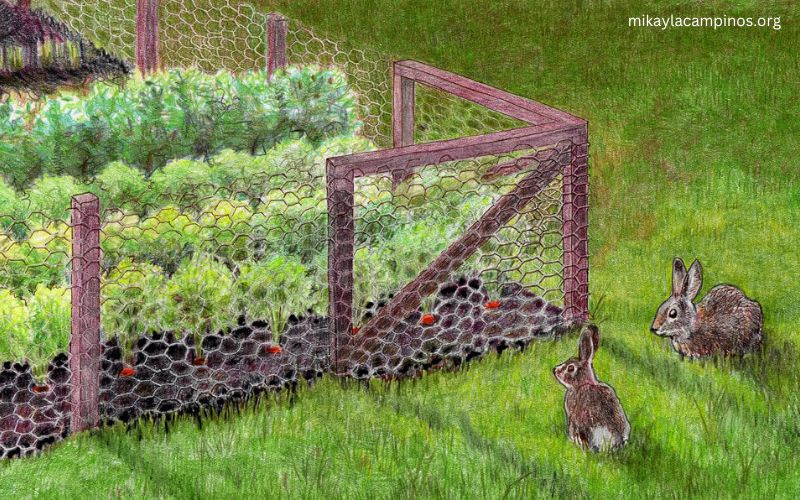Rabbits can be a persistent and frustrating problem for many gardeners. These furry creatures can quickly destroy your hard work by feasting on your prized plants, vegetables, and flowers. Whether you have a small backyard garden or a sprawling landscape, rabbits can wreak havoc if left unchecked. Understanding the rabbit problem in your garden is the first step in finding effective solutions to keep them at bay.
Rabbits are attracted to gardens for a variety of reasons, including the abundance of food, shelter, and water. They are particularly drawn to tender young plants, leafy greens, and even the bark of trees and shrubs. As their populations grow, they can become increasingly bold and persistent in their quest for sustenance, leading to significant damage to your garden.
Addressing the rabbit problem in your garden requires a multi-faceted approach that combines various deterrent methods and strategies. By understanding the importance of keeping rabbits out and implementing a combination of natural and physical barriers, you can protect your garden and enjoy a bountiful harvest.
The Importance of Keeping Rabbits Out of Your Garden
Keeping rabbits out of your garden is crucial for several reasons. First and foremost, rabbits can cause significant damage to your plants, effectively destroying your hard work and investment in your garden. They can eat through leaves, stems, and even the roots of your plants, leaving them stunted, deformed, or even dead.
Beyond the direct impact on your plants, rabbits can also create other problems in your garden. Their burrowing activities can disrupt the soil structure, leading to erosion and drainage issues. Additionally, their presence can attract predators, such as coyotes or foxes, which can pose a threat to your garden as well as your pets and other wildlife.
Maintaining a rabbit-free garden is essential for ensuring the health and longevity of your plants, as well as preserving the overall aesthetic and functionality of your outdoor space. By implementing effective deterrent methods, you can protect your garden and enjoy the fruits of your labor without the constant worry of rabbit-related damage.
Natural Ways to Keep Rabbits Out of Your Garden
Fortunately, there are several natural and eco-friendly methods you can use to keep rabbits out of your garden. These approaches not only protect your plants but also maintain a harmonious balance with the surrounding environment.
Plant Selection: One of the most effective natural deterrents is choosing rabbit-resistant plants for your garden. Some plants, such as lavender, rosemary, and marigolds, have strong scents or textures that rabbits find unpalatable. By incorporating these types of plants into your garden, you can create a less attractive environment for rabbits.
Companion Planting: Another natural approach is companion planting, which involves strategically placing certain plants together to deter rabbits. For example, planting herbs like thyme, sage, or chives around the perimeter of your garden can help mask the scent of your more vulnerable plants, making them less appealing to rabbits.
Predator Urine: Placing predator urine, such as coyote or fox urine, around the perimeter of your garden can be an effective natural deterrent. The strong scent of these predators can discourage rabbits from entering your garden, as they instinctively avoid areas where potential predators are present.
Noise and Motion Deterrents: Incorporating devices that create noise or motion can also help keep rabbits at bay. Wind chimes, motion-activated sprinklers, or ultrasonic repellers can startle and deter rabbits from entering your garden.
Mulch and Ground Cover: Applying a thick layer of mulch or planting ground cover plants can make it more difficult for rabbits to access your garden. The physical barrier created by the mulch or ground cover can discourage them from digging and burrowing.
By implementing these natural methods, you can create a less inviting environment for rabbits while maintaining a healthy, vibrant garden that is in harmony with the surrounding ecosystem.
Using Barriers and Fences to Protect Your Garden
In addition to natural deterrents, physical barriers and fences can be highly effective in keeping rabbits out of your garden. These solutions create a physical obstacle that rabbits must overcome, making it more difficult for them to access your plants.
Fencing: One of the most reliable methods is to install a sturdy fence around your garden. The fence should be at least 2-3 feet tall and extend several inches into the ground to prevent rabbits from burrowing underneath. Wire mesh or hardware cloth fencing is a popular choice, as it is durable and can be customized to fit your specific garden layout.
Raised Beds: Constructing raised garden beds can also be an effective way to keep rabbits out. Raised beds elevate your plants, making it more challenging for rabbits to reach them. You can further enhance the protection by lining the bottom of the raised beds with hardware cloth or placing the beds on a solid surface, such as a concrete slab or gravel.
Exclusion Netting: Covering your garden with exclusion netting or mesh can create a physical barrier that rabbits cannot penetrate. This method is particularly useful for protecting individual plants or small garden areas, as it can be easily installed and removed as needed.
Buried Fencing: For added protection, you can bury the bottom portion of your fence several inches into the ground. This creates a physical barrier that prevents rabbits from digging underneath the fence and accessing your garden.
Gate and Entry Point Protection: Remember to pay special attention to the entry points of your garden, such as gates or access paths. Ensure that these areas are also properly protected with fencing or other barriers to prevent rabbits from finding a way in.
By combining various fencing and barrier solutions, you can create a comprehensive defense system that effectively keeps rabbits out of your garden while still allowing you to access and enjoy your outdoor space.
Creating a Rabbit-Proof Garden Design
Designing your garden with rabbit-proofing in mind can be a highly effective strategy in keeping these pesky critters at bay. By incorporating specific elements into your garden layout, you can create an environment that is less attractive and accessible to rabbits.
Zoning and Compartmentalization: Consider dividing your garden into distinct zones or compartments, with some areas dedicated to more sensitive or vulnerable plants. This allows you to focus your protective efforts on the areas that are most at risk of rabbit damage.
Pathways and Hardscaping: Incorporating paved pathways, gravel, or other hardscaping elements in your garden can make it more difficult for rabbits to navigate and access your plants. These surfaces provide less cover and make it harder for them to move around undetected.
Vertical Gardening: Utilizing vertical gardening techniques, such as trellises, hanging baskets, or raised beds, can elevate your plants and make them less accessible to rabbits. This can be particularly effective for growing vegetables, vines, or other vulnerable plants.
Shrub and Tree Barriers: Planting dense shrubs or trees around the perimeter of your garden can create a physical and visual barrier that discourages rabbits from entering. Choose species with thorns or thick foliage that rabbits find less appealing.
Water Features: Including water features, such as a small pond or fountain, in your garden design can also help deter rabbits. Rabbits generally avoid areas with open water, as they are vulnerable to predators when drinking.
By carefully planning and designing your garden with rabbit-proofing in mind, you can create an environment that is less attractive and accessible to these unwanted visitors, allowing your plants to thrive and your garden to flourish.
Choosing Rabbit-Resistant Plants for Your Garden
One of the most effective ways to keep rabbits out of your garden is to strategically choose plants that are less appealing to them. Certain plant species have characteristics, such as strong scents, prickly textures, or unpalatable flavors, that make them less desirable for rabbits.
Herbs and Aromatic Plants: Herbs like lavender, rosemary, thyme, and sage are known for their strong scents that can deter rabbits. These plants can be planted around the perimeter of your garden or interspersed throughout to create a natural barrier.
Ornamental Grasses: Many ornamental grass varieties, such as fountain grass or blue fescue, have tough, fibrous leaves that rabbits find unappealing. These grasses can be used as border plants or incorporated into your garden design.
Flowering Plants: Some flowering plants, like marigolds, daffodils, and foxgloves, contain compounds that are toxic or unpalatable to rabbits. These can be used to create a more rabbit-resistant garden.
Succulents and Cacti: Rabbits tend to avoid plants with spiny or prickly textures, making succulents and cacti excellent choices for your garden. Species like agave, yucca, and prickly pear can thrive in many climates and deter rabbit intrusion.
Woody Shrubs: Certain woody shrubs, such as barberry, juniper, and spirea, have dense, thorny foliage that can discourage rabbits from attempting to access your garden.
When selecting plants for your garden, be sure to research their specific rabbit-resistance characteristics and choose a diverse array of species that can work together to create a cohesive and effective rabbit-proof landscape.
Repelling Rabbits with Scent and Sound
In addition to physical barriers and rabbit-resistant plants, you can also leverage the power of scent and sound to deter rabbits from your garden. These methods take advantage of the rabbits’ keen senses and natural instincts to create an environment that they find less appealing.
Scent-Based Repellents: There are various commercial and homemade scent-based repellents that can be effective in keeping rabbits at bay. These include sprays or granules made from ingredients like garlic, castor oil, or predator urine. The strong, unpleasant odors can discourage rabbits from entering your garden.
Motion-Activated Sprinklers: Motion-activated sprinklers can startle and deter rabbits by suddenly spraying water when they approach your garden. These devices are triggered by the movement of the rabbits, creating an unpredictable and unpleasant experience that encourages them to stay away.
Ultrasonic Repellers: Ultrasonic repellers emit high-frequency sounds that are undetectable to humans but can be highly irritating to rabbits. These devices can be strategically placed around your garden to create an uninviting environment for these pests.
Wind Chimes and Noise Makers: The gentle tinkling of wind chimes or the sudden sounds of noise makers can also help deter rabbits. These devices can be installed around the perimeter of your garden or near vulnerable plants to create an environment that rabbits find unsettling.
When using scent-based or sound-based deterrents, it’s important to rotate and vary the products or devices you use. Rabbits can become accustomed to a single deterrent over time, so changing up the methods can help maintain their effectiveness.
DIY Rabbit Repellents and Deterrents
In addition to commercially available products, there are several DIY rabbit repellents and deterrents you can create using common household items. These homemade solutions can be a cost-effective and eco-friendly way to protect your garden.
Garlic and Pepper Spray: Mix together crushed garlic, cayenne pepper, and water in a spray bottle. Spray this solution directly on your plants or around the perimeter of your garden to create an unpleasant scent and taste for rabbits.
Castor Oil and Dish Soap: Combine castor oil and dish soap in water to create a spray that can be applied to your plants. The strong odor and sticky texture can deter rabbits from nibbling on your vegetation.
Egg-Based Repellent: Mix together beaten eggs, water, and a few drops of dish soap. Spray this mixture on your plants to create a barrier that rabbits find unpalatable.
Vinegar and Water: A simple solution of white vinegar and water can also be used as a DIY rabbit repellent. The strong scent of the vinegar can discourage rabbits from entering your garden.
Human Hair: Collecting and placing strands of human hair around the perimeter of your garden can help deter rabbits. The unfamiliar scent can make them wary of approaching your plants.
When using any DIY repellents, be sure to reapply them regularly, especially after rain or watering, to maintain their effectiveness. Additionally, test the solutions on a small area of your plants first to ensure they don’t cause any damage.
Understanding Rabbit Behavior and Habits
To effectively keep rabbits out of your garden, it’s important to understand their behavior and habits. Knowing how rabbits move, what they eat, and where they prefer to live can help you tailor your deterrent strategies for maximum effectiveness.
Rabbits are generally crepuscular, meaning they are most active during the dawn and dusk hours. They are also highly adaptable and can thrive in a variety of environments, from suburban backyards to rural farmlands.
Rabbits are primarily herbivores, feeding on a wide range of plants, including grasses, leafy greens, vegetables, and even the bark of trees and shrubs. They are particularly attracted to tender, young growth, making newly planted or vulnerable plants prime targets.
Rabbits are also known for their burrowing behavior, digging elaborate networks of tunnels and warrens to create shelter and raise their young. These burrows can further contribute to garden damage by disrupting the soil and root systems of your plants.
Understanding these behavioral patterns can help you anticipate when and where rabbits are most likely to cause problems in your garden. By tailoring your deterrent methods to their active periods and feeding preferences, you can increase the effectiveness of your rabbit-proofing efforts.
Conclusion
Keeping rabbits out of your garden is a constant battle, but with a comprehensive and multi-faceted approach, you can successfully protect your plants and enjoy a thriving, rabbit-free outdoor space. By combining natural deterrents, physical barriers, and an understanding of rabbit behavior, you can create a garden that is less inviting and accessible to these persistent pests.
Remember, the key to effective rabbit control is to use a combination of strategies and to be persistent in your efforts. Regularly monitoring your garden, adjusting your methods as needed, and staying vigilant can go a long way in keeping rabbits at bay and preserving the beauty and productivity of your outdoor oasis.
To learn more about protecting your garden from rabbits and other pests, consider subscribing to our gardening newsletter. You’ll receive regular updates, expert tips, and exclusive content to help you create a thriving, pest-free garden. Sign up today and take the first step towards a healthier, more abundant growing season!



